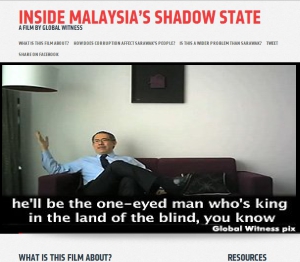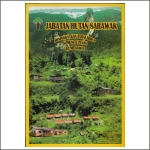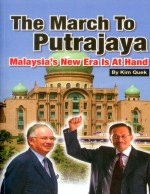 Clive Kessler
Clive Kessler
I spent an interesting morning in the courts last Friday, at the Court of Appeal in the Palace of Justice in Putrajaya.
Background
The morning’s business, as has now been widely reported, was to hand down the decision of the three—judge panel which had heard the government’s (here meaning the former Minister of Home Affairs, Tan Sri Syed Hamid Albar) appeal against the earlier decision of High Court judge Justice Mohamad Ariff Mohd Yusof.
Through an act of judicial review in January 2010 Justice Mohamad Ariff had overturned the ban imposed in July 2008 by the former Home Affairs Minister on the book Muslim Women and the Challenge of Islamic Extremism, edited by Prof. Norani Othman of UKM and published by SIS Forum, generally known as Sisters in Islam.
The book had been published and on sale since 2005.
Suddenly in 2008, the Home Affairs Minister, acting on the advice of Jakim (the Jabatan Kemajuan Islam in the Prime Minister’s office) banned the book on the grounds that it was a threat to public order.
The book had led a quiet, untroubled, uncontroversial and, in scholarly terms, a very productive life for some three years until that moment.
That fact was to prove central to the Appeal Court’s decision.
If the book had created not the slightest stir, or ripple of disquiet, for the first three years of its life, it had demonstrably been no threat to public order.
This was incontrovertible historical fact, not somebody’s merely hypothetical argument.
Hence the former minister’s decision to declare that it was such a threat to public order was, in the Appeal Court’s view, simply and hopelessly irrational. It flew in the very face of the facts. The decision was the product of defective reasoning.
There are a number of interesting aspects of the Court of Appeal’s judgment that merit some comment.
1. Is ministerial discretion absolute?
First, although the decision happily confirms the lifting of a serious restriction upon the exercise of intellectual freedom and on scholarly research and publishing in this country, its main significance is not in the area of such fundamental Constitutional liberties such as the freedom of expression.
It has a more general and far wider relevance.
The Court of Appeal’s judgment is an important reaffirmation, after years of diminution and even eclipse in Malaysia, of the principle of, and of the courts’ rights to exercise, judicial review upon the exercise of “ministerial discretion.”
Judicial review of this kind has been a prominent, and perhaps expanding, aspect of administrative law internationally.
But that has not been the case here in Malaysia.
On the contrary.
Over the past several decades there has been a dramatic diminution, and even exclusion, of the courts’ ability to exercise any significant judicial review upon ministerial decision-making.
This accelerating contraction has been evident historically in a number of areas, perhaps most notably and importantly in the area of detention and renewal of detentions under the Internal Security Act (ISA).
Here the limitations upon judicial review of ministerial discretion have become virtually total.
The position, or “operative doctrine”, has developed that the exercise of ministerial discretion is absolute.
If the minister had decided, that is the end of the matter. He is entitled to decide as he sees fit.
How he formed his judgement, on what advice, whether the advice was appropriate and had been properly understood and evaluated, whether he had properly interpreted and applied that advice, and what his own internal reasoning criteria and processes may have been while exercising his official discretion and judgement — so it has been widely held and understood — may not be pried into or examined by others, and certainly not the courts.
They had no right to “second guess” the minister or to substitute their own preferred reasoning for his.
It is sufficient, so it has been generally held, that he has decided. He has duly exercised his proper function. How he has done so is immaterial. His discretion is absolute.
In its decision handed down last Friday the Court of Appeal judges upheld the doctrine of absolute ministerial discretion, but they also contextualised and so qualified it.
In the Court of Appeal’s view, the exercise of ministerial discretion is absolute so long as it is not inherently flawed.
But if it is flawed — for any one of a number of reasons, such as misplaced relevance, lack of proportionality and the like — then the courts, in the interests of justice and sound public policy, have the right and, when called upon, also the duty to intervene and set things right.
The exercise of ministerial discretion may in this way, in these circumstances, be examined, considered, and even reversed if the minister was demonstrably mistaken or ill-directed, or directed himself poorly, in forming his own judgement.
Flawed ministerial discretion enjoys no categorical protection.
This conclusion, and the judicial reasoning on which it is based, is an important affirmation of legal principle that is likely to have far-reaching consequences.
A judicial basis has now been created for questioning, and even reversing, almost half a century of the unceasing contraction and diminution of the courts’ right of review of ministerial action.
2. The “expansionist unilateralism” of religious officialdom
Second, in the course of its decision the Court of Appeal has drawn another important line.
The fact that something may transgress or offend against Jakim guidelines, the judges declared, does not of itself constitute a threat to public order.
So, Jakim and its directorate may think otherwise, but Jakim’s view of its own authority and powers does not establish any such fact.
This is an important principle, and again one with far-reaching current implications.
One has only to think of the many cases where religious authorities, state and federal, citing their own view of their own autonomous powers, have acted unilaterally against people and practices that may displease them (or challenge their self-asserted right to act without restraint as they please), to see where the implications of the Court of Appeal’s declaration may point.
Often, the religious authorities have acted as if their own interpretations of their own powers and obligations were somehow sacrosanct, beyond legal review or recall, and hence sufficient to override any and all other legal considerations.
The Court of Appeal, in going out of its way to declare that incompatibility with Jakim guidelines does not automatically make something a threat to public order which Jakim may then act to suppress, seems to have the potentiality in the future to place some clear and explicit limitation upon such actions.
Its carefully enunciated words lay down the principled grounds for limiting the currently disquieting, and all too evident, “expansionist unilateralism” of the nation’s religious officialdom.
3. Court restraint upon the development of “legal culture”?
A third point worth making.
As noted the Court of Appeal’s judgment, had to do with judicial review and matters of administrative law — and not with questions of intellectual and academic freedom.
But it was fortunate for the life of scholarship in Malaysia that the Court was able to reach the finding that it did.
Why?
Because in essence, the government and former minister were asking the courts to do a most remarkable — even improbable — thing.
They were asking the Court of Appeal to do something that would be likely to make any court — if it found it was obliged to act as the government and former minister were asking — feel uncomfortable.
They were seeking something that most courts would be likely to find if not unpalatable then at least ironically anomalous.
As has been widely reported and recognized, the book Muslim Women and the Challenge of Islamic Extremism is not a polemical work nor is it an exercise in dissenting theological doctrine.
It is a careful, patient compilation of national case studies by leading international scholars documenting the position and rights of women under Islamic family law — and the effects upon them of recent “reforming” changes to Islamic family law over the last two decades — in some dozen Islamic countries or “shari’ah law jurisdictions”.
The work is a serious contribution to the study of Islamic law, and of its operation and re-codification, in the contemporary world.
In asking the Court of Appeal to re-impose the ban upon that book, the government and former minister were asking the courts significantly to constrain and limit, and perhaps unconscionably to narrow and thwart, the development of serious jurisprudential thought and “legal culture” in this country.
What court could ever be entirely happy at feeling obliged, in legal principle, to help suppress the flourishing of informed, creative and productive legal “discourse”?
4. The declarative public nature of legal decision-making
A fourth and final point.
The court building and precincts at the Palace of Justice in Putrajaya are truly impressive. Perhaps excessively so.
And yet they have one most disappointing, even troubling feature.
One enters into an imposing chamber. At a distance of half the length of an Olympic swimming pool from the public sit the judges. The learned lawyers sit, sometimes stand, and at times also speak in the space immediately in front of the judges.
Why do we have courts?
So that justice may be done.
So that justice may be seen to be done.
And so that the making of justice can be heard as it is being made.
The announcement of a verdict, or as here the enunciation of some new judicial finding upon a principle of law, has an important, and even inherently indispensable, “public declaratory” aspect.
One thing was disappointing in the extreme for the members of the public who were there on the morning — not that they were unduly “put off” by a three-hour delay in securing the assent to the judgment of the third member of the panel, who was absent on urgent judicial duties elsewhere that morning.
That was understood and accepted.
What was disappointing was that, following that delay, the members of the public, including the major parties to the case, who were a seated at the back of the court in the public gallery, could barely hear Justice Abdul Wahab Patail as he read out the important formal declaration of legal facts, findings and principles that he and his colleagues were handing down.
Nor could the public hear the final submissions and responses of the two principal counsel as they jousted over the question of the damages to be awarded.
The counsel were standing, as is appropriate, facing the bench with their backs to the public and, at least in one case, spoke in entirely hushed tones.
The delivering of justice as a declaratory act is too important to be announced in this hushed and seemingly furtive fashion.
Amidst all the other facilities that grace this opulently furnished court chamber, surely an audible, serviceable and functioning public amplification system is also a necessity — not an optional luxury that the interests of justice and the public can easily do without.






















Judiciary is reforming itself ahead of a new government. Will MACC and PDRM follow suit?
Comment by Effendi Nawawi — July 30, 2012 @ 10:05 AM |
The Special Branch is now a component of BN and its assistant director has been treating the rakyat as fools by telling us why we must vote BN. We do not need an idiot in the police force and he should resign as a law enforcement officer to contest as a BN candidate.
Comment by Sazali Ismail — July 30, 2012 @ 9:15 PM |
For the BN the word BAN can just be changed to CAN. Its all up to their self interest only. For example the interlock novel full of shit, they don’t ban. Phono movies are banned but here we have BN phono movie makers and actor getting scot free but others are fined and jailed for showing and distributing phono cds.
Comment by gagojackman — July 30, 2012 @ 9:11 AM |